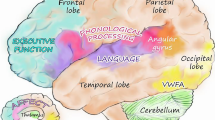Abstract
A study designed to strengthen academic performance in 4 highly disruptive, educable mentally retarded boys revealed that merely presenting academic material on a systematic basis virtually eliminated their disruptive behavior. When differential reinforcement was applied to math or reading, it resulted in maximal performance on that subject matter which was followed by token reinforcement. Further, within 19 hours of reinforcement contingent upon academic performance, reading comprehension improved from a pre-primer to a second-grade level for two children, and from first grade to fourth grade for the other two children. The data suggest it may be possible to reduce or eliminate disruptive behavior by arranging for systematic presentation of academic material.
Similar content being viewed by others
References
AYLLON, T., & AZRIN, N. H. 1968. The token economy: A motivational system for therapy and rehabilitation. New York: Appleton-Century-Crofts.
BARRISH, H. H, SAUNDERS, M, & WOLF, M. M. 1969. Good behavior game: Effects of individual contingencies for group consequences on disruptive behavior in a classroom. Journal of Applied Behavior Analysis, 2, 119–124.
BECKER, W. C., MADSEN, C. H., Jr., ARNOLD, C. R., & THOMAS D. R. 1967. The contingent use of teacher attention and praise in reducing classroom behavior problems. Journal of Special Education, 1, 287–307.
CRAIG, H. B., & HOLLAND, A. L. 1970. Reinforcement of visual attending in classrooms for deaf children. Journal of Applied Behavior Analysis, 3, 97–109.
GLYNN, E. L. 1970. Classroom applications of self-determined reinforcement. Journal of Applied Behavior Analysis, 3, 123–132.
HALL, R. V., CRISTLER, C., CRANSTON, S. S., & TUCKER, B. 1970. Teachers and parents as researchers using multiple baseline designs. Journal of Applied Behavior Analysis, 3, 247–255.
HALL, R. V., LUND, D., & JACKSON, D. 1968. Effects of teacher attention on study behavior. Journal of Applied Behavior Analysis, 1, 1–12.
LOVITT, T. C., & CURTIS, K. A. 1969. Academic response rate as a function of teacher- and self-imposed contingencies. Journal of Applied Behavior Analysis, 2, 49–83.
MCMICHAEL, J. S., & COREY, J. R. 1969. Contingency management in an introductory psychology course produces better learning. Journal of Applied Behavior Analysis, 2, 79–83.
MYERS, W. A. 1970. Operant learning principles applied to teaching introductory statistics. Journal of Applied Behavior Analysis, 3, 191–197.
SHEPPARD, W. C., & MACDERMOT, H. G. 1970. Design and evaluation of a programmed course in introductory psychology. Journal of Applied Behavior Analysis, 3, 5–11.
WALKER, H. M., & BUCKLEY, N. K. 1968. The use of positive reinforcement in conditioning attending behavior. Journal of Applied Behavior Analysis, 1, 245–250.
WOLF, M. M., GILES, D. K., & HALL, R. V. 1968. Experiments with token reinforcement in a remedial classroom. Behavior Research and Therapy, 6, 51–64.
Author information
Authors and Affiliations
Additional information
A portion of this article was presented at the Second Annual Conference on Behavior Analysis in Education, 1971, Lawrence, Kansas. The authors wish to thank Jerry McCullen in the conduct of this study and Louise Berry, George O’Neill, and Michael D. Roberts for their help in the preparation of the manuscript.
Rights and permissions
About this article
Cite this article
Ayllon, T., Layman, D. & Burke, S. Disruptive Behavior and Reinforcement of Academic Performance. Psychol Rec 22, 315–323 (1972). https://doi.org/10.1007/BF03394096
Published:
Issue Date:
DOI: https://doi.org/10.1007/BF03394096




